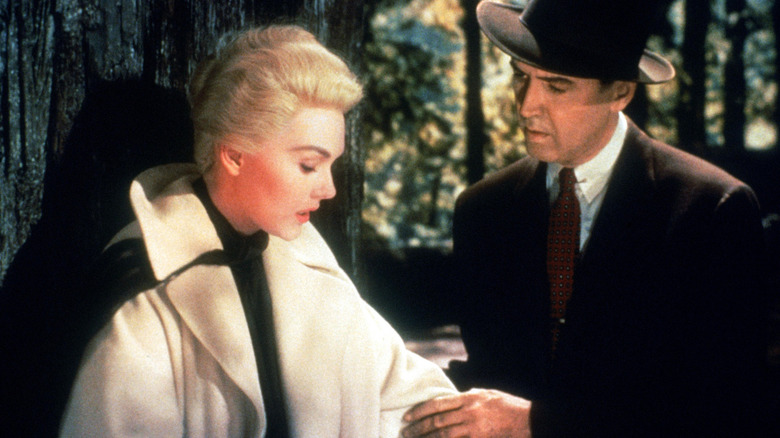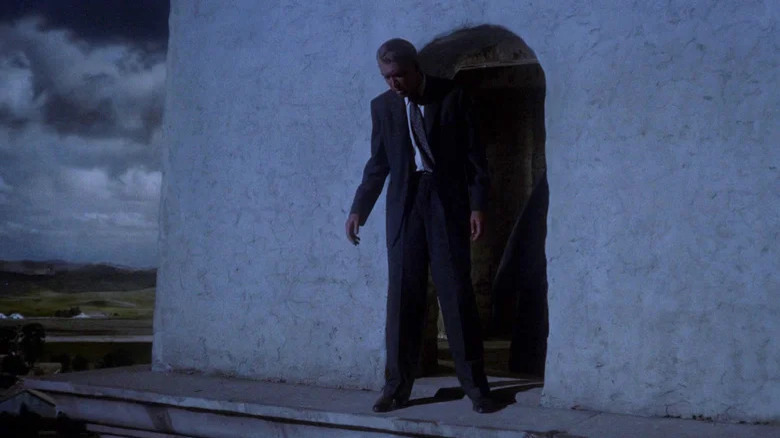Classic Thriller Vertigo Contains A Plot Hole That Always Bothered Alfred Hitchcock
An important thing to keep in mind when evaluating any work of art is that the audience and critical response can change a ton over the years. Such was the case with "Vertigo," the 1958 Alfred Hitchcock thriller that is now rightly recognized as one of the best films ever made, and a career-high for Hitchcock himself. It's a dark, provocative film, one with a lot of fascinating things to say about love and obsession. It's also a remarkably well-directed movie; every single cinematic choice (like filming the driving scenes so Scottie (James Stewart) is almost always driving downhill, never up) contributes to the sense that Scottie is descending towards his doom.
Still, at the time of its release, "Vertigo" received mixed reviews and had a disappointing run at the box office. Contemporary critics declared the film's big twist to be nonsensical, and Hitchcock himself seemed to agree with this, at least during a 1969 interview where he expressed regret about how one element was handled.
His concern was over the details of the movie's big reveal that Madeleine (Kim Novak), whom Scottie's been tasked with investigating, is actually an actor named Judy (also played by Kim Novak). She's been hired as part of a scheme by Scottie's boss, Elster, to murder the real Madeleine; although it first seems like Madeleine throws herself off a bell tower in a feverish trance, we soon learn that Elster had actually thrown his real wife to her death while Judy simply hid and collected her paycheck. This plan relied on Scottie not being able to chase Judy up the stairs in time to witness the switch-a-roo, thanks to his well-established discomfort with heights slowing him down. For Hitchcock, this was the big problem.
Why Vertigo's 'plot hole' doesn't matter
"The husband was planning to throw his wife down from the top of the tower," Hitchcock explained. "But how could he know that James Stewart wouldn't make it up those stairs? Because he became dizzy? How could he be sure of that!?"
He's sort of got a point. It does feel a tad unrealistic for a schemer like Elster to rely so heavily on the assumption that Scottie's dizziness would prevent him from discovering the ruse. If you're going to kill your wife, there are probably safer ways to do so than hiring a doppelganger actor to seduce a PTSD-struggling detective. The movie treats the scheme as a work of genius, one that achieves its goal of making Scottie believe he's a witness to Madeleine's suicide, not murder, and which successfully puts the law's suspicion firmly on Scottie for his incompetence, not on Elster. Sure, Scottie doesn't go to jail or anything for what happened, but the fact that it's him being questioned afterward is meant to highlight how cunning Elster is supposed to be.
But although Hitchcock and his critics are right in that this scheme doesn't hold up to scrutiny, most modern critics agree that it doesn't really matter. The thematic questions raised by the revelation that Scottie's basically fallen in love with a fake person, which results in him spending the rest of the film obsessively trying to turn Judy into a woman who technically never existed, are so interesting that the logistics are hardly relevant. "Vertigo" is a chilling tale of a man's pyrrhic attempts to make his idea of a perfect woman a reality, with devastating consequences for pretty much everyone involved. For those who feel "Vertigo" is the greatest film of all time, a few lapses in realism are beside the point.

